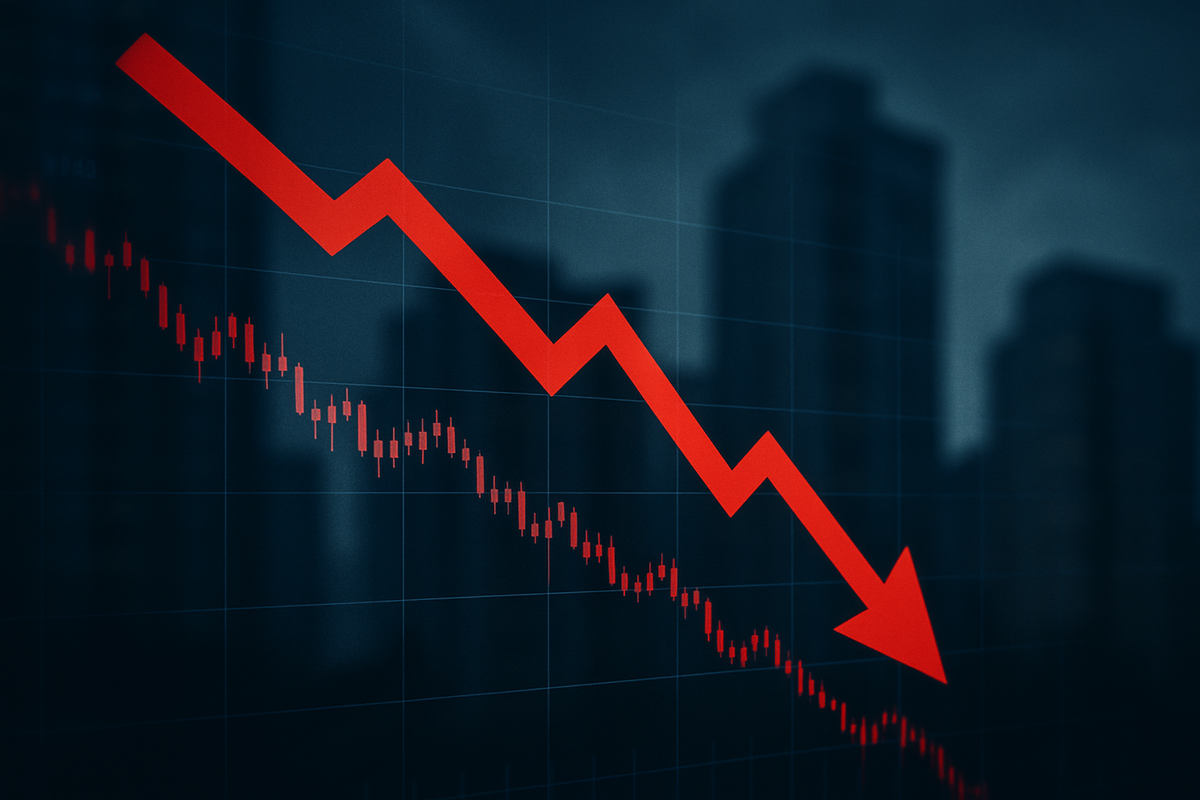
Inno Holdings Inc. (INHD:OTC) experienced a dramatic decline in its stock price today, September 23, 2025, plummeting approximately 28.72%. This sharp drop is the latest episode in a pattern of extreme volatility and financial instability that has characterized the company's performance. The significant sell-off raises critical questions about the firm's operational sustainability and its capacity to navigate an increasingly challenging market landscape.
The substantial downturn is sending ripples through its investor base, particularly those drawn to its previously speculative surges. It underscores the inherent risks associated with highly volatile assets and highlights the importance of fundamental financial health over transient market enthusiasm.
What Happened and Why It Matters
Today's considerable decline for Inno Holdings Inc. is not an isolated incident but rather a continuation of a persistent downward trend and extreme price fluctuations. Reports indicate that the stock had already seen an 8.91% drop on September 8th and a 6.47% slide just yesterday, September 22nd, with some outlets even reporting today's drop as high as 38.56%. This consistent erosion of value stems from a confluence of deep-seated financial challenges and market dynamics.
At the core of INHD's struggles are its persistent negative profitability and substantial losses. For the third quarter ended June 30, 2025, the company reported a net loss of $1.55 million, an increase from $1.06 million in the prior year, with a basic loss per share from continuing operations rising to $0.3 from $0.08. Over the past 12 months, despite revenues of $2.65 million, the company incurred $6.06 million in losses, leading to a loss per share of -$1.68. This consistent inability to generate profits fuels investor apprehension and casts a long shadow over its future.
Adding to the pressure is the stock's high volatility, often driven by speculative trading. INHD has been described as being caught in a "meme frenzy," where rapid intraday surges are frequently followed by sharp pullbacks. This environment, while exciting for some short-term traders, is unsustainable and often leads to significant corrections when the initial "excitement from previous gains" dissipates. Furthermore, the company has seen substantial share dilution, with outstanding shares increasing by 83.57% in the past year, which naturally depresses the value of existing shares.
Finally, concerns about the company's valuation relative to its modest revenue, alongside past regulatory scrutiny, have contributed to a cautious stance from analysts and institutional investors. The absence of current analyst price targets or consensus ratings further reflects the unpredictable nature of INHD's stock.
How This Event Might Affect the Market
The sharp decline of Inno Holdings Inc. (INHD) primarily impacts its direct shareholders and the segment of the market focused on highly speculative small-cap stocks. Given INHD's relatively modest market capitalization, which has hovered between $32.3 million and $48.84 million, its single-day movement is unlikely to trigger a widespread ripple effect across the broader financial markets. However, it serves as a potent reminder of the inherent risks in chasing high-volatility assets.
Companies that might "lose" from this event include current shareholders of INHD who are experiencing significant capital erosion. Additionally, the broader sentiment around other highly speculative or "meme" stocks could be negatively affected if investors become more risk-averse, potentially leading to increased scrutiny or pullbacks in similar volatile assets. Short-sellers, on the other hand, would likely be "winning" from such a significant price drop.
For competitors in the building technology sector, where INHD specializes in cold-formed steel framing and prefabricated homes, the impact is less direct. If INHD's struggles are primarily due to its unique financial mismanagement and speculative trading rather than systemic industry issues, then well-managed competitors might see little direct impact. In fact, if investors become wary of INHD, they might seek more fundamentally sound alternatives within the same sector, potentially benefiting more stable and profitable building technology companies.
The event could also contribute to a broader market trend where investors prioritize fundamental financial health and sustainable growth over speculative surges. This shift could lead to a reallocation of capital towards companies with stronger balance sheets and clearer paths to profitability, potentially dampening enthusiasm for highly leveraged or unprofitable ventures.
Broader Implications
The dramatic decline of Inno Holdings Inc. (INHD) fits into a broader narrative of challenges faced by smaller, often unprofitable companies operating in niche or emerging sectors, particularly when coupled with high speculative interest. While INHD operates in the building technology sector, its struggles highlight the difficulty of translating technological innovation into consistent profitability, especially when capital is scarce and market conditions are volatile. This event could signal a growing investor skepticism towards companies with modest revenues but steep valuations, pushing for a greater emphasis on tangible financial performance.
The potential ripple effects on competitors and partners are nuanced. If INHD's operational model or market segment faces fundamental challenges, such as difficulties in scaling or securing funding for prefabricated housing or AI-driven energy solutions, then other companies in these specific niches might find it harder to attract investment or maintain growth. However, if INHD's issues are predominantly internal—stemming from financial mismanagement, excessive dilution, or an over-reliance on speculative trading—then its competitors might not face direct negative consequences. In some scenarios, INHD's struggles could even free up market share or talent, offering opportunities for more stable players to expand.
Regulatory and policy implications could also emerge. The history of "meme stock" phenomena and extreme volatility has previously drawn the attention of financial regulators. A continued pattern of sharp, unexplained declines in highly speculative stocks like INHD could prompt increased scrutiny from bodies like the SEC regarding market manipulation, disclosure practices, or the protection of retail investors. Such oversight could lead to new regulations or stricter enforcement, impacting how small-cap, volatile stocks are traded and promoted. Historically, periods of extreme market speculation often precede calls for enhanced regulatory frameworks to prevent future excesses.
What the Reader Should Pay Attention to Next
For investors and market observers, the immediate focus concerning Inno Holdings Inc. (INHD) should be on its upcoming financial reports. These reports will provide crucial insights into the company's ability to address its persistent profitability issues and manage its cash flow. Any signs of a strategic pivot, such as cost-cutting measures, new funding rounds, or significant changes in business direction, will be critical indicators of its short-term survival prospects. The company's stated intentions regarding its electronic product trading and AI-driven energy solutions will also bear watching for signs of progress or retreat.
In the short term, the stock is likely to remain highly volatile. Investors should anticipate continued price swings driven by speculative trading, potentially without a clear underlying fundamental catalyst. Long-term possibilities for INHD could range from a successful turnaround, perhaps through a significant capital infusion or a strategic acquisition, to further erosion of value, potentially leading to delisting or bankruptcy if financial performance does not improve.
Market opportunities or challenges may emerge for those with a high-risk tolerance. Some investors might view the significantly depressed stock price as a speculative "buy the dip" opportunity, while others will see it as a cautionary tale to avoid. For the broader market, the INHD situation underscores the ongoing challenge of distinguishing between genuine innovation and speculative bubbles, particularly in the small-cap and emerging technology sectors. It reinforces the importance of due diligence and understanding a company's fundamentals beyond just its market narrative.
Potential scenarios include INHD attempting to raise more capital, which would likely lead to further dilution of existing shares, or exploring strategic partnerships to shore up its financial position. Conversely, continued losses could force the company to significantly scale back operations or even face insolvency.
Conclusion
The substantial 28.72% decline in Inno Holdings Inc. (INHD) stock today is a stark reminder of the inherent risks and extreme volatility associated with companies facing significant financial headwinds and high speculative interest. The event underscores that market enthusiasm, particularly when driven by "meme" dynamics, cannot indefinitely override fundamental business challenges such as persistent unprofitability, share dilution, and modest revenue against steep valuations.
Moving forward, the market will be keenly assessing INHD's ability to fundamentally restructure its operations and achieve sustainable profitability. The company's ongoing financial reports and any strategic announcements will be paramount in determining its trajectory. While the direct impact on the broader market is limited due to INHD's small capitalization, this event serves as a significant cautionary tale for investors tempted by high-risk, high-reward opportunities without a solid foundation of financial health.
Investors should watch for any substantive changes in INHD's financial performance, management's strategic responses to its current challenges, and any potential regulatory actions or increased scrutiny on highly volatile stocks. The lasting impact of this event will likely be felt most acutely by INHD's existing shareholders, but it also reinforces a broader market trend towards a more cautious and fundamentally driven investment approach in the face of speculative excesses.
This content is intended for informational purposes only and is not financial advice





